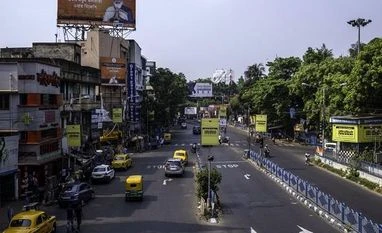- Recent interventions from the Reserve Bank of India have kept yields on 10-year sovereign bonds in check. But, the lockdowns could make it hard to keep borrowing costs low for much longer
- Any revenue shortfall would stoke fears of a further rise in government borrowings, already near records, adding upward pressure on yields
- Earlier this month, the central bank announced the second tranche of its Government Securities Acquisition Programme -- India’s version of quantitative easing -- under which it will buy 350 billion rupees ($4.8 billion) of sovereign bonds on May 20.
- The lockdowns risk higher prices for everything from essential drugs to cars, due to the disruption of supply chains. Consumer-price inflation was already on course to test the upper limit of the RBI’s 2%-6% target, and recent gains in wholesale prices signal more pressure. If those strains build, the RBI may struggle to sell bonds to investors at current yields
- Relative progress fighting the pandemic has been an important factor in global currency markets. India and South Africa present a case study in that among the so-called Fragile Five emerging-markets: Turkey, Brazil, South Africa, India and Indonesia
- India’s rupee is down about 0.5% against the dollar this quarter even after a recent rebound, while South Africa’s rand has gained 5.1%. Read more about the rupee outlook
- India is facing the world’s worst outbreak, contributing to half of the fresh infections in the world, while South Africa has seen new cases fall about 90% from a recent peak in January. India reported 669 infections per 100,000 people over the past month, about 10 times that of South Africa, according to Bloomberg calculations based on data compiled by Johns Hopkins University
- The rupee has slipped down the rankings relative to Asian peers after leading the pack in the first quarter. Any national lockdown could deal a further blow
- Jefferies forecasts India’s economy will grow 10.2% in the year through March 2022, down 3 percentage points from its initial outlook. The figure already must be taken with a grain of salt given the contraction in the year-ago period. Any slowdown could weigh on corporate earnings
- Analysts have started to cut price targets for stocks of some of the biggest banks and automobile giants
- “Markets will correct if the government announces a nationwide lockdown,” said Naveen Kulkarni, chief investment officer at Axis Securities Ltd. “However, the critical factor will be the duration. The longer any lockdown is, the greater will be the correction.”
- Goldman Sachs turned neutral on Indian credits last month, expecting limited room for outperformance
- Citing headwinds due to lockdowns, research firm CreditSights also changed its recommendation last month on local companies including Indian Oil Corp. and Reliance Industries Ltd. to underperform
- DBS Bank warned that the market is getting complacent after India’s dollar bonds showed some signs of recovery after a sell-off in the first half of April
- Investors may be too optimistic given the likelihood of a more persistent impact from the pandemic fallout on the finances of companies and households, it said
To read the full story, Subscribe Now at just Rs 249 a month
Already a subscriber? Log in
Subscribe To BS Premium
₹249
Renews automatically
₹1699₹1999
Opt for auto renewal and save Rs. 300 Renews automatically
₹1999
What you get on BS Premium?
-
Unlock 30+ premium stories daily hand-picked by our editors, across devices on browser and app.
-
Pick your 5 favourite companies, get a daily email with all news updates on them.
Full access to our intuitive epaper - clip, save, share articles from any device; newspaper archives from 2006.
Preferential invites to Business Standard events.
Curated newsletters on markets, personal finance, policy & politics, start-ups, technology, and more.
Need More Information - write to us at assist@bsmail.in
)